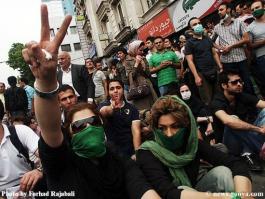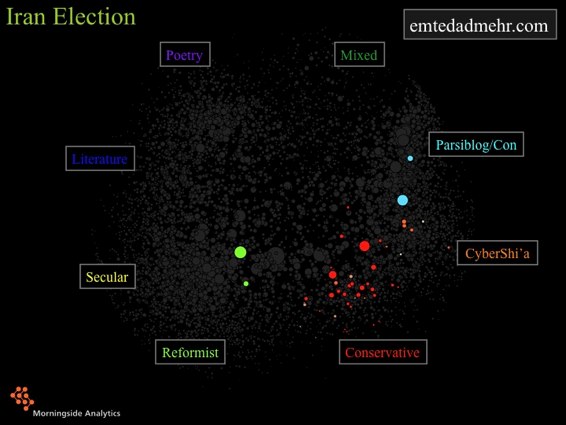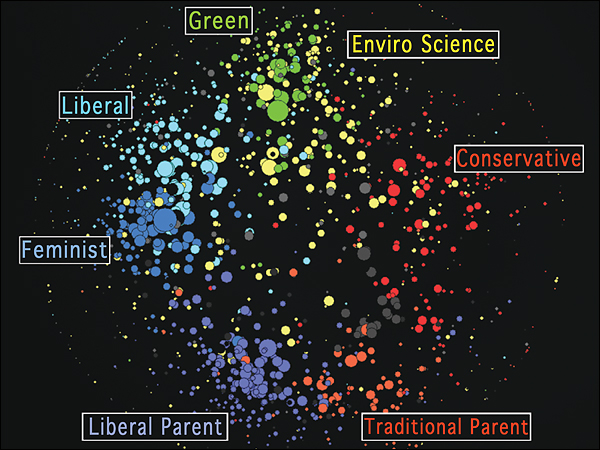
Cross-posted on the ONI Blog
The Internet and mobile phones have taken on a major role in Iranian politics over the last several months. As protests over the contested election results continue in Iran, the government has dramatically increased its control over digital technologies. Many important Web sites have been blocked over the past couple of days, including the Web sites of the opposition parties in Iran, Facebook, Twitter, and YouTube. While political organizers have learned to leverage the organizing power of Web 2.0 tools, government censors in Iran are quick to shut them down when they are most effective. None of this is surprising; it reflects similar events seen in many places around the world.
Digital tools have been shown to be effective political organizing tools, from the Obama presidential campaign in the US to Ukraine, Colombia and Moldova. As powerful as new technologies may be as political tools, information and communication technologies have also been proven to be exceedingly fragile; in countries where the government has sufficient latitude to interfere with the use of these tools, they are easily disrupted and if necessary, can be shut down entirely.
The role of information and communication technologies in Iranian politics has matured rapidly over the past year. Political opposition groups in particular have adopted new online and mobile phone-based organizing tactics, using Facebook, Twitter, Web sites, email, cell phones and SMS and the full suite of Web 2.0 tools as mechanisms for political organizing. This is has all taken place in a highly restrictive media environment in which the Internet and other forms of digital communication are intensely regulated. Facebook has been blocked and unblocked several times in the past year. The rationale and legal justifications for censoring Internet communications are broad. Anything construed as anti-Islamic or damaging to the Iranian state can be blocked by what amounts to executive fiat, although there are many voices within the institutions charged with blocking web sites in Iran.
Earlier reports that the government shut down the Internet entirely during the June 12 elections appear to be exaggerated. Jim Cowie at Renesys looked at the evidence from international routing data and indeed found evidence of some strange events in Iran’s traffic to the outside.
However, the Internet is still up in Iran, though reports from inside Iran suggest that it is much slower than normal and a broader range of websites are being blocked. The fact that Iran has invested so much in blocking Internet content might mean that they have greater confidence about keeping tight controls over content available in Iran without shutting down the Internet entirely, as Burma had done in the face of popular protests there.
After a large surge in SMS traffic in the run-up to the election, multiple sources inside Iran reported that the country’s SMS networks went down just nine hours before the polls opened. This is unsurprising, as SMS has been used in many places as a powerful tool for organizing protests. Reporters Without Borders reports that the SMS take-down was part of attempt to prevent opposition supporters from collecting election results.
By Saturday, all mobile phone services had been shut off in Tehran. Plans by an organization led by former president Rafsanjani to carry out election monitoring using cell phones might have factored into this decision. Cell phone service was restored on June 14, but SMS continues to be blocked.
Western media sources have covered the news as it unfolds, although some US media outlets have been criticized for not focusing more attention on the events in Iran. The government has not thrown western journalists out of the country, though it has made reporting difficult. The BBC has traced the jamming of one of its satellites, which has interrupted access to radio and television for audiences in Iran, the Middle East and Europe, to a location inside Iran.
Despite the tightening restrictions on communications tools, citizen journalists inside Iran have been hard at work. Video clips are widely available on the net, as are photos of Iranian voters and post-election protests. Although YouTube and DailyMotion are both blocked, we were able to upload a small video to Vimeo. The generally slow Internet speeds will hinder the upload of large files.
ONI has confirmed the expansion of blocking over the past several days, making access to ongoing reporting of events as well as political organizing far more difficult for Iranians. In the past several days, YouTube, Twitter, and Facebook have been blocked. The English version of BBC is now blocked; the Persian version has been blocked for months. Websites of the major opposition candidates are all blocked, including Mousavi’s website (mirhussein.com) and Karoubi’s website (teribon.com). The blog host, blogfa.com, has been down for several days now, preventing many Iranian bloggers from updating their blogs.
We tested the thirty web sites that receive disproportionate attention from the reformist segments of the Iran blogosphere and about half of these are not blocked, including norooznews.ir, webneveshteha.com, emruz.biz, emruz.info, yaarinews.com, mowj.ir, maryamshab.blogfa.com, mirhussein.com, masoudbehnoud.com, drmoeen.ir and noandish.com. Among those not blocked include ghalamnews.ir, aftabnews.ir and khatami.ir. (Thanks to John Kelly for the list of sites that we tested. This is derived from the blogosphere mapping work of John Kelly and Bruce Etling).
In response, some pro-democracy activists are targeting government Web sites with DDOS attacks in an attempt to strike back at the current regime. While they have had some success – leader.ir, ahmadinejad.ir, and iribnews.ir were reported to be down – experts worry that the attacks may be used by the Iranian government to justify their own filtering or, worse, may cripple the Iranian network as a whole. (Note: Leader.ir was back up when we tested. Ahmadinejad.ir and iribnews.ir were still down.)
Many years of Internet filtering have prompted the development of circumvention tools by and for Iranians. Many Internet users in Iran have become adept at getting past the Internet censors there. An unintended consequence is that there are many sophisticated users and tools that are prepared to circumvent government attempts to limit access to online sites. This increase in filtering associated with the elections can be expected to increase the demand for access to and knowledge about circumvention technology.
These measures to further limit access to information around the contested election results are not going to help the current the Iranian government if it seeks to build legitimacy.







 Click Here
Click Here